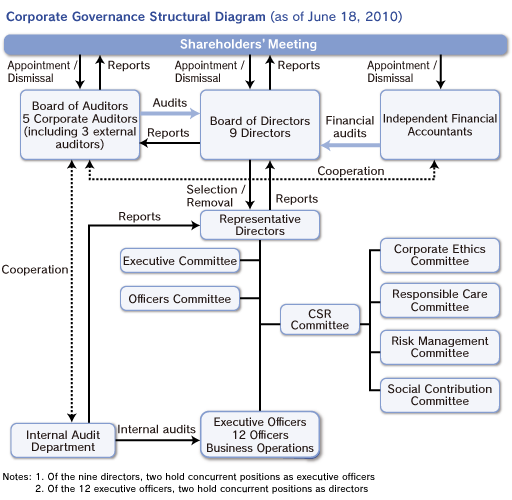Basic Approach
It is the JSR Group's goal to stably and thoroughly actualize its corporate philosophy. This shall be done through efficient and transparent business management, by sustaining sound and healthy business practices. The Group will also continuously strive to create new corporate values. It is hoped that these and other such efforts will secure the trust of all our stakeholders, in order to become an attractive and highly satisfying corporate operation.
The JSR Group employs an auditor system to maximize its current business management system. The other goal is to ensure fair, transparent and timely business management practices.
Moreover, the Group has clarified the authority and responsibilities of the directors who tackle management issues for the entire Group as well as the executive officers in charge of overseeing business processes by introducing an executive officer system. This is improving supervisory functions in addition to helping to speed up decision making and execution of duties.
Furthermore, the Internal Audit Department has also been established as an entity in charge of internal audits for the entire Group.
The JSR Group adopted basic policies regarding its internal control system in accordance with the provisions of the Companies Act and works to reinforce and enhance internal controls. The Internal Audit Department performs systematic internal audits of the business operations and status of compliance by each JSR division and Group company, and takes measures to ensure and improve the effectiveness of internal controls by confirming corporate ethics and legal compliance for the entire group.

Business Management System
- (1) Board of Directors
- The Board of Directors is a panel of nine full-time directors. They are required to discuss, review and finalize important business issues to promote business activities. The board oversees the execution of the directors’ duties. As a rule, the board convenes for a meeting once a month, and is chaired by the chairman of JSR. The meeting is also attended by a total of five corporate auditors, including three third-party auditors appointed from outside the company, to gain insight of their opinions.
- (2) Executive Committee
- The Executive Committee deliberates and steers the Group in advance, as well as receives reports on matters concerning basic management strategies, policies and plans, as well as the major executive issues of the individual departments. Of the bills submitted to the Executive Committee, those that are deemed necessary are brought up for discussion before the Board of Directors where they undergo deliberation. The Executive Committee comprises all of the directors. However, deliberations and reports are attended by full-time corporate auditors. As a general rule, the Committee meets every Monday except the third Monday of the month with the president acting as chairman.
- (3) Officers Committee
- The Officers Committee was established in October 2008 to report on the business operations of each division, disseminate information on key matters, and foster internal communications. The Officers Committee comprises all directors, executive officers, and full-time corporate auditors, excluding those who have been posted overseas. In principle, the Committee meets on the third Monday of each month and is chaired by the president.
- (4) Board of Auditors
- The Board of Auditors is composed of five corporate auditors, including three external auditors. As a general rule, the Board of Auditors meets once a month as stipulated in the Regulations of the Board of Auditors to carry out reports, discussions and decisions on important matters. Based on the Auditing Standards for Auditors, in addition to the meetings of the Board of Directors, the auditors attend other important meetings, such as those of the Executive Committee, and endeavor to gain an understanding of the processes of important decision making and how duties are being executed. They form their opinions on audit-related matters upon discussions and reports received from independent financial accountants, board members and other persons.
- (5) CSR Committee
- The CSR Committee was established to monitor the implementation of corporate social responsibility, corporate ethics and legal compliance. The Committee oversees and directs four subcommittees to reinforce CSR activities: the Corporate Ethics Committee, which establishes corporate ethics standards and works to prevent the occurrence of corporate misconduct; the Responsible Care Committee, which encourages “responsible care” and works towards the development of a sustainable society; the Risk Management Committee, which works to reinforce risk management; and the Social Contribution Committee, which examines social contribution activities that the JSR Group ought to conduct.
- (6) Internal Audit Department
- The duty of the Internal Audit Department is to audit whether the internally integrated system of JSR itself and the JSR Group companies are functioning properly. The department also assesses and evaluates the results, and indicates corrective measures, through guidance, recommendation and advice according to the evaluation.
Return to the top of the page ▲
